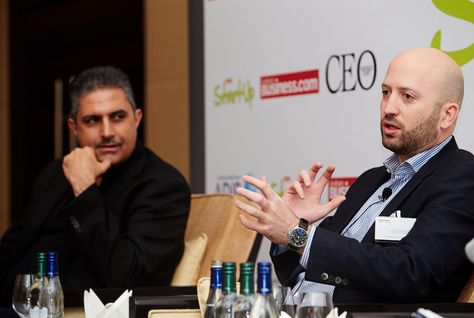
“In a city like Dubai, if you are a start-up, you have no choice but to go regional or international because the local market is small. It should be a part of your DNA and then the question is ‘when’ more than ‘if’,” said Prashant K. (PK) Gulati, a technology innovator, angel investor, and mentor, in an on-stage interview at the recent Arabian Business StartUp Academy.
Themed ‘Start-Up Lessons from Other Markets,’ the fourth and last edition of the Arabian Business Startup Academy in this year’s series hosted Gulati and Amir Farha, co-founder and managing partner at BECO Capital, to advise entrepreneurs on how to take their businesses to the next level and venture into other regional and global markets.
Once they have built and maintained a local customer base, many entrepreneurs consider taking the next step – expanding across borders. The Wamda Research Lab’s study – “Enhancing Access: Assessing the Funding Landscape for MENA’s Start-ups” – stated that 76 percent of the surveyed MENA-based companies planned to open new offices in the next 1-2 years, especially in KSA and the UAE.
According to our guest speakers, the chosen business model determines the timing of this decision. “A good example is Careem versus PropertyFinder, which are two of our portfolio companies,” advised Farha. “You have Careem which has taken a much more aggressive expansion plan. They have gone across cities and they have taken more of a market share approach, where they are now in more than 45 cities in the span of a few years. PropertyFinder is much more locally ingrained. They haven’t necessarily focused on scaling up into new markets as much as Careem.
“Looking at it from an expansion plan perspective, for the PropertyFinders of this world that are locally entrenched, our advice is to solidify their position in their home market before they look at expanding.
“If you are a Careem model, where you actually benefit from getting into new markets, the sooner you get there, the better, because it increases your value proposition.”
Careem, a taxi-booking mobile application launched in the UAE, has grown from a simple idea to a vast company that has come to operate in 47 cities in less than four years. It recently launched operations in Istanbul, Turkey, with plans to increase presence in 15 new cities in Saudi Arabia, Egypt and Pakistan. It is reportedly also considering a possible expansion into East Africa.
As part of their expansion plans in Saudi Arabia, Careem acquired Enwani, a local home delivery service, back in 2015. Similarly, Dubai-based Propertyfinder Group opted to acquire Moroccan property portal SeleKtimmo as part of its plans to become the dominant player in the kingdom.
“We had an experience early on in our investment life, where we invested in a Dubai-based company and they wanted to expand into the Saudi market,” Farha advised the attendees on how to choose an appropriate market entry strategy.
“What they did was that they actually hired somebody on the ground to roll out their business. What we found with that strategy was that because of the distance between them, the founder was not able to monitor or kind of push them to build his business there.
“After three months, they realised that they were not able to create the traction they needed for it to be a viable expansion, and they had to let go of this particular individual.
“What we saw in that example, which is what I definitely recommend to most of our portfolio companies, was the different outcome between hiring people versus going on the ground and doing it yourself.
“We also have examples, such as PropertyFinder who acqua-hired an entrepreneur who was trying to build up the same business that they were doing in Dubai. That has worked very well for them because that individual is entrepreneurial and he understands what it takes to build a business.”
To get their expansion on track, entrepreneurs turn to investors not only for funding but also for help and guidance. When deciding whether to support a start-up’s business expansion plans, Gulati and Farha agreed, investors bet on teams capable of delivering results.
“We look at the team, how focused and driven they are, how passionate they are about solving the problem that they are tackling, and what kind of domain expertise they have in that particular area,” said Farha.
“Then we look at the size of the market and whether it is a big enough problem that they are solving. We are mainly focused on the Middle East, so we look at the size of that opportunity in the region. If it is big enough, then it is exciting for us.
“Then…

